A Taste of the Mediterranean at the Food and Nutrition Conference and Expo
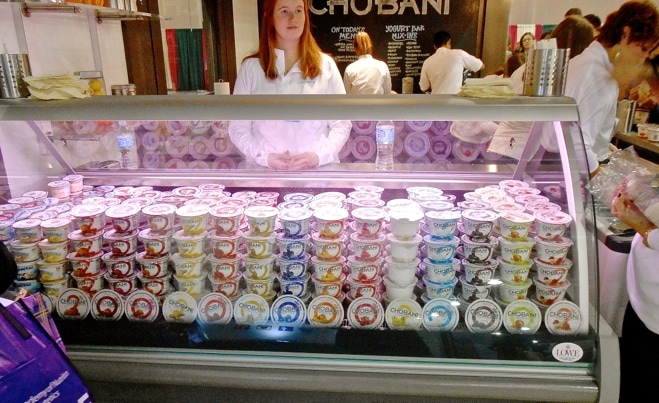
Every fall, the Academy of Nutrition and Dietetics (former American Dietetic Association) organizes a conference known as the Food and Nutrition Conference and Expo (FNCE). Over 8,000 registered dietitians (sometimes more), nutrition science researchers, policy makers, health-care providers and industry leaders attend this conference
I have been going to FNCE for several years now, and as President-Elect of the International Affiliate the American Overseas Dietetic Association (AODA) it is the place to meet up with colleagues from all over the world. This year I am proud to announce that I also received the award for AODA Outstanding Dietitian of the Year (yay!).
Attending these conferences is always interesting because you can see the trends in the U.S. food and nutrition community. Since I have been living in Greece for the past ten years, for me it is a place to stay connected with what is happening and how the Mediterranean diet or aspects of the Mediterranean diet are being promoted there.
At the expo, it is quite competitive among exhibitors to gain the attendees attention. The big food companies usually have the largest exhibitions with plenty of samples, food, books, pens- you name it. You really need to be selective and not get carried away and look for those small exhibitors that have unique and sometimes healthier products.
So here are food products related to the Mediterranean diet that I spotted at the conference.
Greek Yogurt
Of course Greek yogurt had a strong presence at the conference, more so than previous conferences. Chobani had by far the most impressive exhibition booth-I would actually call it a store. They were giving out the normal packaged yogurts but they also had a yogurt bar where you could add any topping you wanted. I only had some plain yogurt (the best way to judge it); it was good with no added ingredients that shouldn’t be there. Yoplait was also there presenting their 100 calorie-Greek yogurts with cherry. It was tasty but real Greek yogurt it was not: apart from the sugar, according to the label it included less than 2% of corn starch, natural flavor, sucralose and acesulfame potassium. Stonyfield Oikos yogurt as well as Yasso frozen yogurt were also there. I would be lying if I didn’t say that I was a bit disappointed not to see Fage (an actual Greek company) present at the conference particularly as they were the first to introduce “Greek” style yogurt in the US. In any case, when choosing yogurt don’t get impressed by all the bells and whistles. Start with plain yogurt (no added starches, flavorings) and add your own toppings.
Beans
I am always happy to see beans at these conferences. Dietitians love beans, and they are always thinking of creative ways to add them to the diet. I especially like them because they are a staple of the Greek-Mediterranean diet, one of the reasons being that Greeks fasted from animal products 180 days a year so beans were a main source of protein. I find though that they try and promote recipes that kind of “hide” the beans (I saw somewhere a cake made with beans), I mean do we really need to hide them? Canadian Lentils gave out a cookbook with plenty of lentil recipes, the Bean Institute was also sharing recipes and I liked the concept of the bean mix. Bob’s Red Mill had a 13-bean soup mix, which only contains beans (no other ingredients or additives). I probably wouldn’t make a soup, but a Greek-style bean dish cooked with olive oil, tomato, and onion and eat it with some feta cheese.
Nuts
Of course nuts are everywhere at this conference. National boards such as the Almond board, California Walnut Board, Georgia Pecans etc., were present. Nuts are an important part of the Mediterranean diet, another source of plant protein but of antioxidants as well. Greeks are particularly fond of the walnut, so I was especially happy when I saw that the walnut board had walnut recipe booklet devoted to the Mediterranean diet.
Olive Oil
Olive oil this year was present more than any of the other years that I have attended. I am not really sure why the olive oil industry has not really approached dietitians in the past, especially as other types of oils (canola) have been promoted for years. This year I was happy to see the International Olive Council and the North American Olive Oil Association providing information about the different types of olive oil, storage, health benefits and cooking ideas. I wrote about it in Olive Oil Times if you want to learn more about that. There were a few olive oil companies and they promoted their products with tasty recipes and snacks (which I will share at later posts). I also noticed that it was mostly promoted for salads, dips etc. rather than cooking or baking. In the future it would be nice to see culinary demonstrations, more samples of actual olive oils and a more in-depth explanation of the benefits of olive oil, and how to use it for cooking. The truth is I came across several dietitians who still have the misconception that you shouldn’t cook or sauté or fry or bake with olive oil. Not true. Just to clarify, when cooking with olive oil at home, you won’t reach the smoke point of olive oil (as we are often warned) in a common household stovetop or oven.
Fruits and Vegetables
It’s a good sign when you see national councils and boards of fruit and vegetables: grapes, watermelon, avocado, raisins, strawberries, mushrooms, pears, blueberries were all represented and they were really out there providing books, recipes, and of course food.
Other Mediterranean inspired products
There were of course plenty of products claiming to be Mediterranean. Sometimes it seems that if a product has oregano or some other herb or feta cheese, it magically becomes “Mediterranean” or “Greek” even though the rest of the ingredients are artificial. Adding the word “Mediterranean” makes one think that it is healthier, natural, etc. when in reality that is not the case. There were two products though that I found interesting.
Lentil crisps from the Mediterranean Snack Company had decent ingredients, made from bean flower and cornflower and a combination of olive oil and another vegetable oil. They did not contain saturated fat and had fewer calories than a normal potato or nacho chip. While crackers and crisps are not part of a traditional Mediterranean diet and I wouldn’t recommend them as daily staple, if you are going to pick some sort of snack these are not bad.
Another interesting product was Gourmet Garden herb and spice blends. Basically herbs in a tube that you can refrigerate for 3 months after opening or freeze for 6 months. If it encourages people to use more spices and herbs, which are a very important part of the Mediterranean diet, than that’s a good thing. But let’s not forget that dry herbs are also an excellent source of antioxidants.
I was happy to see the Tomato Products Wellness Council raising awareness about the humble, often ignored tomato.
So there you have it. Yes, there are plenty of healthy and Mediterranean ingredients promoted to nutrition professionals at this conference, if you look for them.
For additional information on plant based ingredients presented at FNCE, check out this article by fellow dietitian Victoria Shanta Retelny.
In my next posts I’ll be sharing the tastiest, Mediterranean inspired recipes from the conference.
*Olive Tomato has no affiliation with the above organizations and companies.

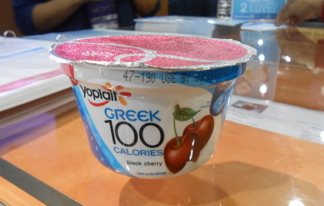
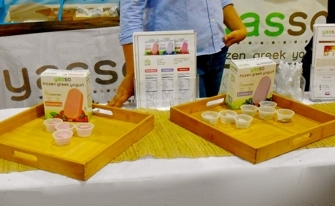

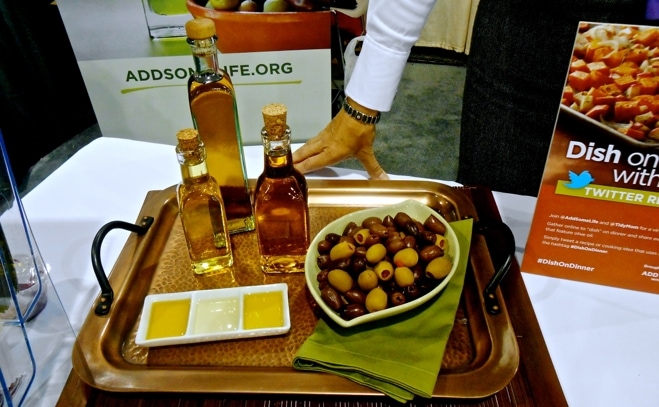
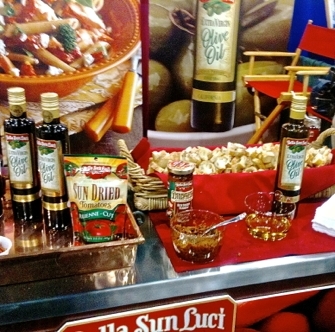
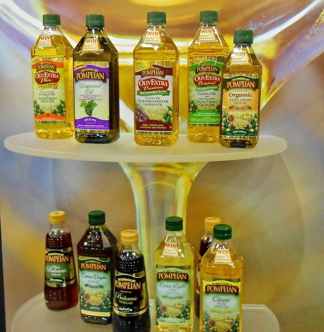
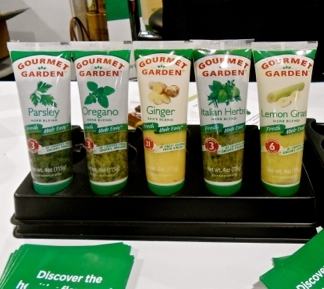
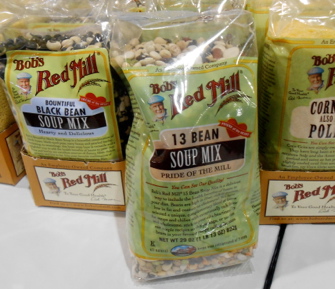
Hi Elena,
This is a wonderful post and review of the Mediterranean foods showcased at FNCE. I was wondering why you didn’t link to the Almond Board of California as you did for the other nut boards? The Almond Board has an entire Health Professional section on their website with teaching tools and resources for RDs! Feel free to link to this page: http://www.almondboard.com/HealthProfessionals/Pages/Default.aspx. (Client)
Best Regards!
Thanks for pointing out the missing link! Just added it!
I enjoyed your review very much, Elena! This year I missed FNCE since I am living in Austria temporarily, until January. Because we are so close, my husband and I just spent our 9-day holiday in Turkey — close to Greece. We enjoyed many true Mediterranean foods and I am now really interested in cooking/eating eggplant, feta cheese and pomegranates. I love Mediterranean based ingredients and flavors. Thank you for alerting me to what was represented at FNCE in Philadelphia.
Thanks Cindy! I love eggplant! By the way you may want to choose temporarily AODA as your affiliate while you are in Austria and stay connected with other RD’s who are international.
Great information here. I’m learning more and more about true health foods and not the disguised ones. Thanks for the info.
Jenni
Thanks Jenni! Glad you enjoyed the post.